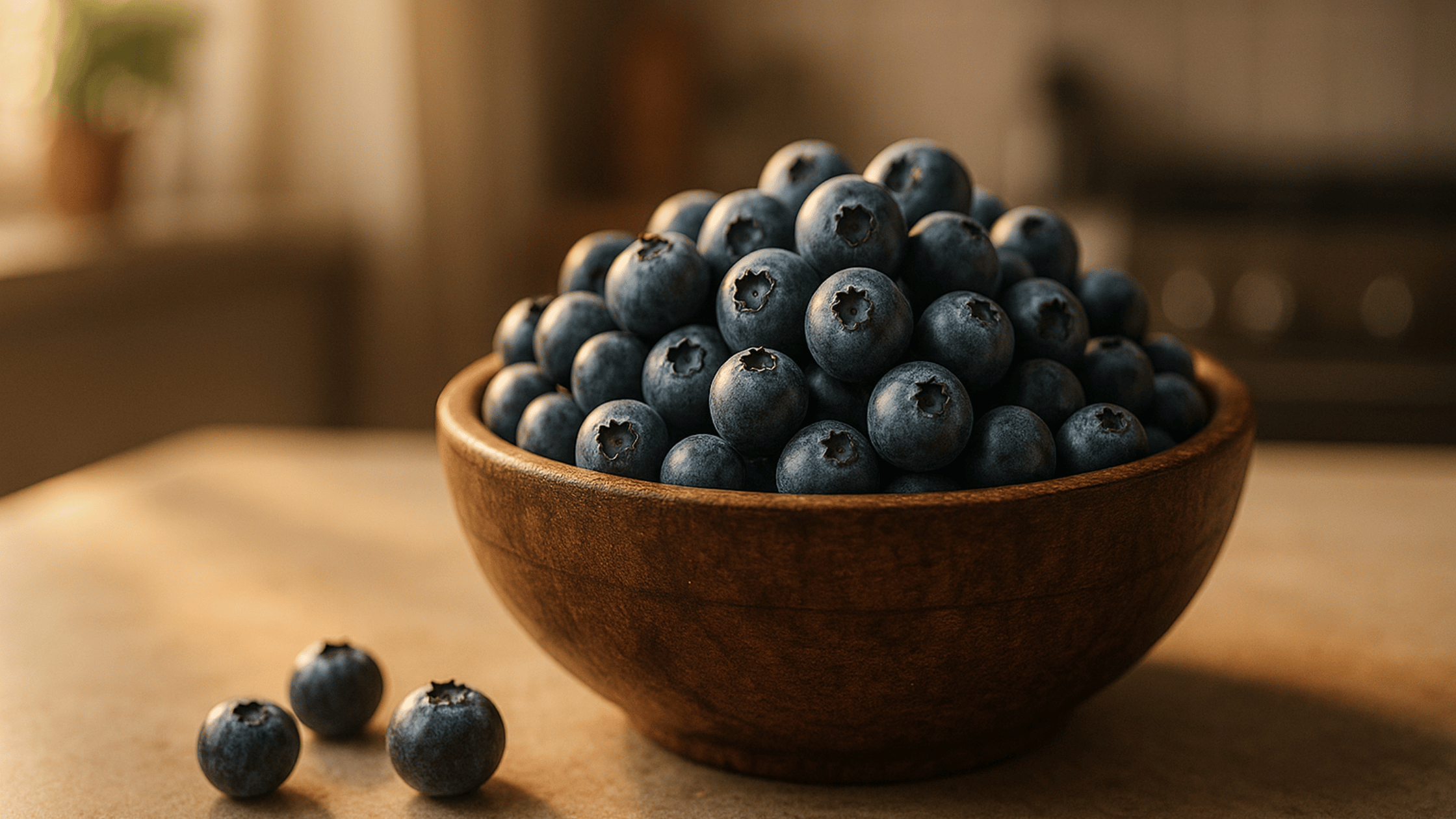Nutrition facts for blueberries demonstrate why these seemingly humble berries have earned the title “superfruit.” Bursting with vitamins, hydration, fiber, and potent phytonutrients, blueberries provide a wide range of health advantages—from supporting heart and brain health to aiding digestion and promoting longevity. This deep-dive guide unpacks everything you need to know about blueberry nutrition: macros, micronutrients, antioxidant power, health impacts, harvest stages, storage, recipe ideas, and essential FAQs to support your wellness journey.

Nutrition Facts for Blueberries: Macronutrients, Hydration & Energy
Blueberries consist of approximately 84% water, giving them incredible natural hydration. In a 100‑gram serving—about ¾ cup—you get just around 57 calories, 14.5 grams of carbohydrates, including 10 grams of natural sugars and 2.4 grams of fiber, along with 0.7 grams of protein and 0.3 grams of fat. These figures position blueberries as a refreshingly hydrating yet low‑calorie food that fills you up without overwhelming your calorie intake. The fiber-sugar combination also ensures a steady, gentle release of energy, making blueberries an excellent snack for both immediate fuel and sustained nourishment throughout the day. Their satisfying texture and appealing sweetness enable them to function as a natural energy booster that doesn’t spike blood sugar.
Micronutrients in the Nutrition Facts for Blueberries
Blueberries may be small, but they’re nutritionally mighty. A 100‑gram portion delivers valuable amounts of vitamin C, supporting skin health and immune defense; vitamin K, essential for bone strength and proper blood clotting; and manganese, which aids metabolism and antioxidant systems. They also provide modest levels of potassium, magnesium, calcium, and iron, making them a rich source of multiple foundational minerals.
What truly elevates blueberries is their phytochemical richness—especially anthocyanins, the pigments responsible for their deep blue hue. Anthocyanins exhibit powerful antioxidant and anti‑inflammatory properties, helping protect your cells from damage and promote overall metabolic resilience.
Compared to other fruits like avocados, the nutrition facts for blueberries show significantly higher antioxidant levels, making them ideal for heart and brain support.
Nutrition Facts for Avocado: A Complete Guide to this Nutrient-Dense Superfood
Health Benefits Rooted in the Nutrition Facts for Blueberries
Blueberries are more than a tasty fruit; their nutrition sparks real physiological benefits. First, their anthocyanins offer significant support for blood vessel function and heart health, helping maintain healthy blood pressure. For the brain, these same compounds enhance neuron communication and may help preserve cognitive function against age-related decline. In terms of blood sugar management, the combination of fiber and antioxidants helps dampen spikes, making blueberries a smart inclusion in meals or snacks for metabolic stability. Their fiber also nourishes a healthy gut microbiome, and their low-calorie profile makes them ideal for appetite regulation and weight-conscious eating.
Ripeness, Form & Preparation
The nutritional value of blueberries can shift based on ripeness and how you prepare them. Fully ripe berries often offer the greatest antioxidant potency and sweetness. Slightly underripe blueberries contain more resistant starch—a prebiotic component beneficial for digestion and blood sugar control. Unsweetened frozen blueberries typically mirror the nutritional profile of fresh ones, as flash-freezing preserves most vitamins and antioxidants. Dried blueberries, while convenient, concentrate sugars and calories and should be used sparingly—best when mixed into yogurt or baked goods in small portions. Blending blueberries into smoothies makes their nutrients easier to absorb, especially when balanced with protein or healthy fats for a slower sugar release.
Tips for Choosing, Storing & Maximizing Your Nutrition Facts for Blueberries
When selecting fresh blueberries, look for firm, plump berries with a taut, silvery bloom—that’s a sign of natural protection. If fresh options are limited, unsweetened frozen berries are a smart alternative offering similar nutritional value. To store fresh blueberries effectively, avoid washing them until serving; store them in a ventilated container in the refrigerator and aim to use them within a week for peak flavor and nutrient retention. For freezing, spread out the berries initially to freeze each one individually, then transfer to an airtight, freezer-safe bag. Blueberries’ versatility shines in various preparations: try them with overnight oats, blended into smoothies, folded into green salads, stirred into porridge, or cooked into a healthy compote with warming spices.
Key Nutrition Highlights (One Structured Bullet Section)
- Abundant in hydration and fiber, yet low in calories.
- Rich source of immune-supporting vitamin C, bone-supporting vitamin K, and metabolism-supporting manganese.
- Packed with anthocyanins—powerful antioxidants with anti-inflammatory and cognitive benefits.
- Supports heart, brain, metabolic, and digestive health in a single, flavorful package.
If you’re building a weight-loss-friendly diet, combining the nutrition facts for blueberries with other low-calorie fruits like cucumber can enhance both hydration and digestion.
Nutrition Facts for Cucumber: Hydration, Health Benefits, and Weight Loss Value
Frequently Asked Questions
Q: How many calories are in one cup of blueberries?
A cup of blueberries has approximately 84 calories, making them an easy-choice food for nutrient loading without excessive calories.
Q: Does freezing blueberries reduce their nutritional value?
Not significantly. Frozen blueberries, especially if unsweetened, retain most of their vitamins and antioxidants, making them a practical substitute when fresh ones aren’t available.
Q: Can blueberries help reduce blood pressure?
Yes, numerous studies link blueberry intake with improved artery function and blood pressure regulation thanks to their anthocyanin and potassium content.
Q: Are blueberries keto-friendly?
In moderation. While blueberries contain natural sugars, a small amount—like a handful—can fit into low-carb or ketogenic eating when balanced with other low-carb foods.
Q: How often should you eat blueberries to reap health benefits?
Daily or near-daily consumption, such as a small bowl or handful, supports long-term health due to its antioxidant and micronutrient contributions.
Conclusion: Why Nutrition Facts for Blueberries Elevate Them to Everyday Superfood Status
When you unpack the nutrition facts for blueberries, you discover a superfruit loaded with hydration, fiber, essential nutrients, and cellular protection—all in a delicious, vibrant form. Blueberries adapt to a variety of dietary needs—whether for energy during activity, disease prevention, recovery after stress, or mindful snacking. Keep blueberries in your daily rotation—blend them into smoothies, sprinkle them over meals, or enjoy them on their own. These little blue gems are small, flavorful, and incredibly powerful—truly a nutritional powerhouse worth celebrating.
For a balanced breakfast, mix blueberries with high-protein ingredients or pair them with potassium-rich options like bananas to complement their fiber-rich profile.
Nutrition Facts for Banana: The Complete Guide to This Everyday Superfruit
Ready to make blueberries a staple in your diet? Bookmark this guide and share it with others looking to boost their health naturally—one berry at a time.







